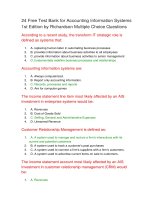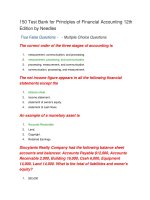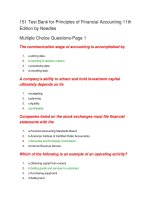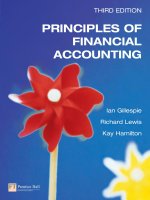150 test bank for principles of financial accounting 12th edition by needles
Bạn đang xem bản rút gọn của tài liệu. Xem và tải ngay bản đầy đủ của tài liệu tại đây (140.82 KB, 27 trang )
150 Test Bank for Principles of Financial Accounting 12th
Edition by Needles
True False Questions - - Multiple Choice Questions
The correct order of the three stages of accounting is
1.
measurement, communication, and processing.
2.
measurement, processing, and communication
3.
processing, measurement, and communication.
4.
communication, processing, and measurement.
The net income figure appears in all the following financial
statements except the
1.
balance sheet.
2.
income statement.
3.
statement of owner's equity.
4.
statement of cash flows.
An example of a monetary asset is
1.
Accounts Receivable.
2.
Land.
3.
Copyright.
4.
Retained Earnings.
Sinoyianis Realty Company had the following balance sheet
accounts and balances: Accounts Payable $12,000,
Accounts Receivable 2,000, Building 16,000, Cash 6,000,
Equipment 14,000, Land 14,000. What is the total of
liabilities and owner's equity?
1.
$32,000
2.
$36,000
3.
$26,000
4.
$52,000
Which of the following is legallya separate entity from its
owner(s)?
1.
Sole proprietorship and partnership only
2.
Corporation only
3.
Partnership only
4.
Sole proprietorship only
All of the following are broad principles underlying the
accountant's code of professional ethics except
1.
objectivity
2.
loyalty
3.
integrity
4.
independence
Transfer of ownership will affect the continuity of a
1.
sole proprietorship.
2.
corporation.
3.
sole proprietorship or partnership.
4.
partnership.
The recording of data falls under which stage of accounting?
1.
processing
2.
measurement
3.
decision making
4.
communication
The best definition of assetsis the:
1.
cash owned by the company.
2.
resources belonging to a company having future benefit to the company.
3.
collection of resources belonging to the company and the claims on these resources.
4.
owner's investment in the business.
The group of users of accounting information charged with
achieving the goals of the business is its
1.
investors.
2.
creditors.
3.
auditors.
4.
managers.
All of the following statements about partnerships are true
except
1.
a change in ownership will dissolve the partnership.
2.
any partner can enter into a binding agreement with a third party.
3.
partners must share profits and losses equally.
4.
all partners have unlimited liability.
The Sarbanes-Oxley Act of 2002 applies to all except
1.
internal management reports
2.
annual reports
3.
quarterly statements
4.
none of these are exceptions
An accounting measurement is concerned with all exceptwhich
of the following?
1.
Business transaction
2.
Money measure
3.
Separate entity
4.
Financial position
Which of the following accounts is not considered an asset?
1.
Accounts Receivable
2.
Inventory
3.
Accounts Payable
4.
Trademark
Which of the following represents the proper order of financial
statement preparation?
1.
Balance sheet, statement of cash flows, statement of owner's equity, income statement
2.
Income statement, statement of owner's equity, balance sheet, statement of cash flows
3.
Statement of cash flows, balance sheet, income statement, statement of owner's equity
4.
Statement of owner's equity, income statement, statement of cash flows, balance sheet
Which of the following is an example of a financing activity?
1.
Obtaining a bank loan
2.
Selling equipment
3.
Purchasing land
4.
Paying taxes to the government
The Sarbanes-Oxley Act of 2002 came, in part, as a result of
1.
the WorldCom scandal
2.
the Enron scandal
3.
the Enron and WorldCom scandals
4.
the Target scandal
Which of the following is the most appropriate definition of
accounting?
1.
Ameans of recording transactions and keeping records
2.
The interconnected network of subsystems necessary to operate a business
3.
The measurement, processing, and communication of financial information about an
identifiable economic entity
4.
Electronic collection, organization, and communication of vast amounts of information
An audit is an examination of a company’s
1.
financial statements.
2.
accounting controls.
3.
accounting systems.
4.
all of these.
Which of the following is the correct accounting equation?
1.
Assets + Owner's Equity = Liabilities
2.
Assets = Liabilities + Owner's Equity
3.
Assets + Liabilities = Owner's Equity
4.
Assets = Liabilities – Owner's Equity
All of the following statements about corporations are true
except
1.
ownership is represented by shares of stock.
2.
they are chartered by the state.
3.
the sale of stock does not dissolve the business.
4.
the stockholders have direct control of the business.
Which of the following is an example of an operating activity?
1.
Purchasing equipment
2.
Selling goods and services to customers
3.
Selling land
4.
Obtaining capital from owners
The purpose of an audit is to
1.
comply with income tax regulations.
2.
determine whether or not a companyis a good investment.
3.
ascertain that the financial statements follow GAAP.
4.
determine whether or not a company is a good credit risk.
The following users of accounting information have a direct
financial interest in a business except
1.
an investor.
2.
a creditor.
3.
management.
4.
a financial adviser.
Generally accepted accounting principles
1.
have eliminated all weaknesses in accounting practice.
2.
are accounting rules formulated by the Internal Revenue Service.
3.
are sound in theory but rarely used in practice.
4.
are changing continually.
The topic of foreign exchange rates relates most closely to the
concept of
1.
business transactions.
2.
separate entity.
3.
money measure.
4.
nonexchange transactions.
Which of the following transactions does notinvolve an
exchange of value?
1.
Loss from theft
2.
Purchase of a building on credit
3.
Payment of a debt
4.
Borrowing money
The development of international accounting standards is the
primary function of the
1.
IRS.
2.
IASB.
3.
AICPA.
4.
PCAOB.
Those who lend money or deliver goods and services before
being paid are called
1.
creditors.
2.
investors.
3.
underwriters.
4.
debtors.
Which of the following items has noeffect on owner's equity?
1.
Payment of an expense
2.
Receipt of cash owed to the business (accounts receivable)
3.
Withdrawal by the owner
4.
Sale of a service
The communication stage of accounting is accomplished by
1.
reportingto decision makers.
2.
processing data.
3.
storing data.
4.
recording data.
All of the following items would appear on the balance sheet
except
1.
the owner's capital account.
2.
Accounts Receivable.
3.
withdrawals.
4.
Patents.
Which of the following transactions involves an exchange of
value?
1.
Fire damage
2.
Accumulation of interest
3.
Sale of services
4.
Wear and tear on machinery
The personal assets and liabilities of an owner are not shown
on the business’s financial statements because of the
1.
financial position concept.
2.
objectivity concept.
3.
separate entity concept.
4.
sole proprietorship concept.
Which of the following financial statements is concerned with
the enterprise at a point in time?
1.
Statement of cash flows
2.
Balance sheet
3.
Income statement
4.
Statement of owner's equity
Which of the following is an agency of the U.S. government?
1.
AICPA
2.
FASB
3.
IASB
4.
SEC
Sinoyianis Realty Company had the following balance sheet
accounts and balances: Accounts Payable $12,000,
Accounts Receivable 2,000, Building 16,000, Cash 6,000,
Equipment 14,000, Land 14,000. If the equipment were
sold for $14,000, what would be the total of owner's
equity?
1.
$8,000
2.
$22,000
3.
$40,000
4.
$36,000
Sinoyianis Realty Company had the following balance sheet
accounts and balances: Accounts Payable $12,000,
Accounts Receivable 2,000, Building 16,000, Cash 6,000,
Equipment 14,000, Land 14,000. What is the balance of the
Flora Sinoyianis, Capital account?
1.
$28,000
2.
$40,000
3.
$8,000
4.
$12,000
The purchase of land is an example of a(n)
1.
operating activity.
2.
capital activity.
3.
financing activity.
4.
investing activity.
Which of the following might be motivation for fraudulently
covering up a financial weakness?
1.
to meet stockholder expectations
2.
to obtain a loan
3.
all of these are possible motivations
4.
to obtain bonus compensation
Which of the following physically prepare and audit financial
reports?
1.
chief executives
2.
accountants
3.
managers
4.
board of directors
Which of the following assets could be described as
nonphysical?
1.
Cash
2.
Inventory
3.
Supplies
4.
Trademarks
Which of the following is an example of an investing activity?
1.
Purchasing a building
2.
Producing goods and services
3.
Paying off a loan
4.
Employing workers
The statement of cash flows would disclose the purchase of a
building for cash
1.
in the investing activities section.
2.
nowhere on the statement.
3.
in the operating activities section.
4.
in the financing activities section.
The following users of accounting information have an indirect
financial interest in the business except
1.
taxing authority.
2.
regulatory agency.
3.
labor union.
4.
creditor.
Sinoyianis Realty Company had the following balance sheet
accounts and balances: Accounts Payable $12,000,
Accounts Receivable 2,000, Building 16,000, Cash 6,000,
Equipment 14,000, Land 14,000. If, $6,000 of Accounts
Payable were paid in cash, what would be the balance of
the Flora Sinoyianis, Capital account?
1.
$36,000
2.
$28,000
3.
$40,000
4.
$8,000
Fraudulent financial reporting at Enron resulted in
1.
thousands of people losing their pensions and investment incomes.
2.
thousands of people losing their jobs.
3.
prison sentences and fines for corporate executives.
4.
all of these choices.
Companies listed on the stock exchanges must file financial
statements with the
1.
Internal Revenue Service.
2.
Securities and Exchange Commission.
3.
Financial Accounting Standards Board.
4.
American Institute of Certified Public Accountants.
All of the following are considered nonexchange transactions
except
1.
the wear and tear on machinery.
2.
the day-by-day accumulation of interest.
3.
losses from fire, flood, and theft.
4.
the sale of goods and services.
An auditor maintains no direct financial interest in the company
he or she is auditing. The principle being followed is:
1.
independence.
2.
integrity.
3.
due care.
4.
objectivity.
The authoritative bodycurrentlyresponsible for
establishingaccountingpractice is the
1.
Federal Reserve Board.
2.
Internal Revenue Service.
3.
American Institute of Certified Public Accountants.
4.
Financial Accounting Standards Board.
Sinoyianis Realty Company had the following balance sheet
accounts and balances: Accounts Payable $12,000,
Accounts Receivable 2,000, Building 16,000, Cash 6,000,
Equipment 14,000, Land 14,000. If, $6,000 of Accounts
Payable were paid in cash, what would be the total of
liabilities and owner's equity?
1.
$28,000
2.
$52,000
3.
$46,000
4.
$34,000
A company's ability to attract and hold investment capital
ultimately depends on its
1.
planning.
2.
profitability.
3.
liquidity.
4.
budgeting.
Which of the following is a regulatory agency?
1.
FASB
2.
SEC
3.
IASB
4.
GASB
Which of the following are required to swear that financial
reports are accurate and complete?
1.
managers
2.
board of directors
3.
chief executives
4.
accountants
The statement of cash flows would disclose the withdrawal of
cash by the owner
1.
in the financing activities section.
2.
in the investing activities section.
3.
in the operating activities section.
4.
nowhere on the statement.
Which of the following forms of organization are considered to
be separate entities by accountants?
1.
Corporations only
2.
Sole proprietorships only
3.
Partnerships only
4.
Sole proprietorships, partnerships, and corporations
Which of the following groups uses accounting information
primarily to help protect the public?
1.
Regulatory agencies
2.
Economic planners
3.
Management
4.
Taxing authorities
The Public Company Accounting Oversight Board was created
by the
1.
IASB.
2.
GASB.
3.
IRS.
4.
Sarbanes-Oxley Act.
A liability would notinclude an obligation to
1.
hire an employee.
2.
transfer assets.
3.
provide services.
4.
pay cash.
The intentional preparation of misleading financial statements,
known as fraudulent financial reporting, can result from
all of the following except
1.
recording a revenue that has been earned but not yet received.
2.
the misapplication of accounting principles.
3.
the manipulation of inventory records.
4.
fictitious sales or orders.
All of the followingstatements are true about the SarbanesOxleyAct except
1.
its primary goal is to regulate financial reporting and the accounting profession.
2.
it orders the SEC to draw up certain rules.
3.
it shields chief executives from criminal penalties.
4.
it applies to publicly traded companies.
Most business enterprises in the United States are
1.
partnerships.
2.
corporations.
3.
government units.
4.
sole proprietorships.
Carrying out professional responsibilities with competence and
diligence is called
1.
objectivity.
2.
due care.
3.
integrity.
4.
independence.
True-False Questions
Payment to a creditor is an example of a nonexchange business
transaction.
1.
True
2.
False
Using cash to expand by purchasing land and a building is an
example of an operating activity.
1.
True
2.
False
In general, one partner acting alone cannot obligate the
partnership to another party.
1.
True
2.
False
The Sarbanes-Oxley Act orders the SEC to hold chief executives
and CFOs responsible for the accuracy of their
company's financial statements.
1.
True
2.
False
An increase in expenses will have the effect of reducing owner's
equity.
1.
True
2.
False
Liquidity means nothaving enough funds on hand to pay debts
when they fall due.
1.
True
2.
False
Two major goals of business are to achieve profitability and to
achieve liquidity.
1.
True
2.
False
Creditors' equitiesis another term for liabilities.
1.
False
2.
True
Corporations represent the largest number of businesses in the
United States.
1.
False
2.
True
The International Accounting Standards Board is the primary
and most important determinant of generally accepted
accounting principles.
1.
True
2.
False
Acorporation is an economic unit that is legally separate from
its owners.
1.
True
2.
False
The economic resources invested in a business by the owner
are represented by owner's equity.
1.
True
2.
False
Accountants consider money the common unit of measure for
all business transactions.
1.
True
2.
False
If a company has suffered only net losses since its inception,
the owner's equity account will always have a negative
balance.
1.
False
2.
True
The statement of owner's equity discloses the owner's
withdrawals made during the period.
1.
False
2.
True
The statement of owner's equity relates the income statement to
the balance sheet by showing how the owner's capital
account changed during the accounting period.
1.
True
2.
False
The liability of corporate stockholders is limited to their
percentage share of ownership.
1.
False
2.
True
The statement of cash flows discloses significant events related
to the operating, investing, and financing activities of a
business.
1.
False
2.
True
Knowledge of the exchange rate is necessary to apply the
money measure concept in case of international
transactions.
1.
False
2.
True
For reporting purposes, the personal assets and debts of a
business owner should be combined with the assets and
debts of the business.
1.
True
2.
False
Not-for-profit organizations have no obligation to report their
financial performance to outside parties.
1.
False
2.
True
Managerial accounting focuses on internal decision making.
1.
True
2.
False
A proper heading for the income statement could include “For
the Year Ended December 31, 20--.”
1.
True
2.
False
Financial position may be assessed by referring to a balance
sheet.
1.
True
2.
False
Misleading financial reports are not considered fraudulent if
they are the result of the misapplication of accounting
principles.
1.
True
2.
False
The purchase of equipment is an example of an investing
activity.
1.
True
2.
False
Revenues have the effect of increasing owner's capital.
1.
False
2.
True
A major function of financial accounting is to provide the
investor with relevant and useful information.
1.
False
2.
True
Less than 20 percent of the U.S. economy is generated by
governmental and not-for-profit organizations.
1.
False
2.
True
Acompany's management information system is a subsystem of
its accounting information system.
1.
True
2.
False
Exchange rates for currency change daily according to the
supply and demand for each currency.
1.
False
2.
True
The stockholders of a corporation elect the board of directors.
1.
True
2.
False
The heading for a balance sheet might include the line “For the
Month Ended December 31, 20--.”
1.
False
2.
True
Sole proprietorships in the United States generate more
business (in terms of receipts) than partnerships and
corporations put together.
1.
True
2.
False
The account ‘Wages Payable’ would appear on the income
statement.
1.
True
2.
False
The terms “bookkeeping” and “accounting” are not
synonymous.
1.
True
2.
False
Owner's equity equals cumulative net income or loss plus
owner investments minus cumulative withdrawals.
1.
False
2.
True
A partnership is dissolved when any partner leaves the
business or dies.
1.
False
2.
True
The evaluation and interpretation of financial statements and
related performance measures is called technical
analysis.
1.
False
2.
True
The day-by-day accumulation of interest is considered a
transaction involving an exchange of value.
1.
False
2.
True
Financing a business means obtaining funds so the business
can begin and continue operating.
1.
False
2.
True
Revenues have the effect of increasing owner's capital.
1.
True
2.
False
The account ‘Supplies’ will appear as an expense on the income
statement.
1.
True
2.
False
Net income is a measure of profitability.
1.
True
2.
False
For accounting purposes, a business and its owner are
considered the same entity.
1.
False
2.
True
Owner's equity equals assets minus liabilities
1.
False
2.
True
Accounts Receivable is an asset that is considered
nonmonetary in nature.
1.
False
2.
True
The personal resources of any partner can be called upon to
pay the obligations of the partnership.
1.
False
2.
True
Generally accepted accounting principles encompass the
conventions, rules, and procedures necessary to define
accepted accounting practice at a particular time.
1.
True
2.
False
Net incomeis another term for revenues.
1.
False
2.
True
The balance sheet is also known as the statement of financial
position.
1.
True
2.
False
Accounting ratios are useful as management performance
measures.
1.
False
2.
True
Both public accountants and managerial accountants are
required to adhere to a code of professional conduct.
1.
True
2.
False
Paying taxes to the government is an example of an operating
activity.
1.
True
2.
False
Staff accountants express their duty to ensure financial reports
are not false or misleading in the management report that
appears as part of the company’s annual report.
1.
True
2.
False
The board of directors appoints the audit committee, which in
turn performs an independent audit of the company's
records.
1.
False
2.
True
The purchase of land with cash would be disclosed on the
statement of cash flows.
1.
True
2.
False
Regulatory agencies are considered information users with an
indirect financial interest.
1.
False
2.
True
The processing stage of accounting is accomplished by the
recording of data.
1.
True
2.
False
Financial accountinginformation is used primarily by
management.
1.
False
2.
True
Net assets equal owner’s equity.
1.
False
2.
True
Responsibility for ethical financial reporting rests solely with
the accountant.
1.
True
2.
False
Cashis another term for owner's equity.
1.
True
2.
False
The Federal Reserve Board is an example of a consumer group.
1.
False
2.
True
Objectivity is the avoidance of all relationships that impair or
appear to impair the objectivity of the accountant.
1.
True
2.
False
The Securities and Exchange Commission is an accounting
information user with an indirect financial interest.
1.
False
2.
True
Due care means carrying out one's professional responsibilities
with competence and diligence.
1.
True
2.
False
Regulatory agencies are considered information users with an
indirect financial interest.
1.
True
2.
False
Owner withdrawals are an example of an expense.
1.
False
2.
True
Criminal penalties can be imposed on those who prepare
fraudulent financial statements.
1.
True
2.
False
One way of stating the accounting equation is: Assets +
Liabilities = Owner's Equity.
1.
False
2.
True
Accountants focus on the needs for financial information by
both internal and external decision makers.
1.
False
2.
True
When a corporate stockholder sells his or her shares of stock,
the corporation is technically dissolved.
1.
True
2.
False
Independence means subordinating personal gain to service
and the public trust.
1.
False
2.
True
Companies whose securities are sold to the general public must
adhere to standards established by the Securities and
Exchange Commission.
1.
True
2.
False
The obligation to provide services to another entity is a type of
liability.
1.
True
2.
False
The Internal Revenue Service is responsible for issuing
accounting standards for state and local governments.
1.
True









